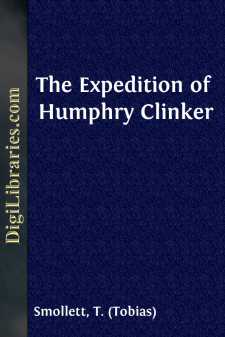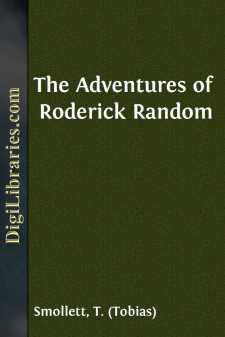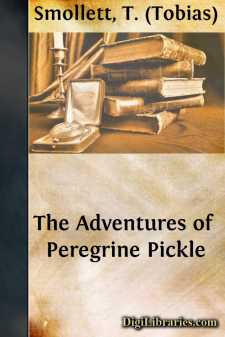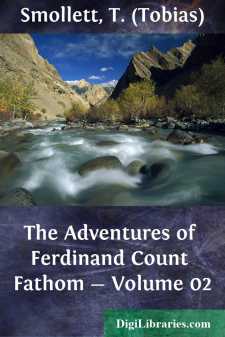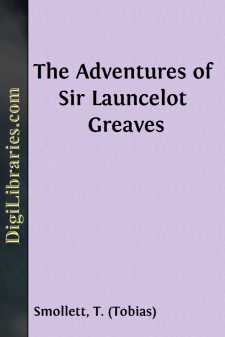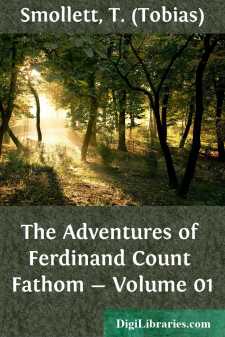Categories
- Antiques & Collectibles 13
- Architecture 36
- Art 48
- Bibles 22
- Biography & Autobiography 813
- Body, Mind & Spirit 142
- Business & Economics 28
- Children's Books 17
- Children's Fiction 14
- Computers 4
- Cooking 94
- Crafts & Hobbies 4
- Drama 346
- Education 46
- Family & Relationships 57
- Fiction 11829
- Games 19
- Gardening 17
- Health & Fitness 34
- History 1377
- House & Home 1
- Humor 147
- Juvenile Fiction 1873
- Juvenile Nonfiction 202
- Language Arts & Disciplines 88
- Law 16
- Literary Collections 686
- Literary Criticism 179
- Mathematics 13
- Medical 41
- Music 40
- Nature 179
- Non-Classifiable 1768
- Performing Arts 7
- Periodicals 1453
- Philosophy 64
- Photography 2
- Poetry 896
- Political Science 203
- Psychology 42
- Reference 154
- Religion 513
- Science 126
- Self-Help 84
- Social Science 81
- Sports & Recreation 34
- Study Aids 3
- Technology & Engineering 59
- Transportation 23
- Travel 463
- True Crime 29
T. (Tobias) Smollett
Tobias Smollett (1721-1771) was a prominent Scottish novelist, poet, and surgeon known for his picaresque novels, including "The Adventures of Roderick Random" and "The Expedition of Humphry Clinker." His works often satirize contemporary society and politics, blending humor with biting social commentary. Smollett's influence extended beyond literature to his contributions in translating works like Cervantes' "Don Quixote" and in writing significant historical accounts.
Author's Books:
Sort by:
About five days ago we arrived in London, after an easy journey from Bath; during which, however, we were overturned, and met with some other little incidents, which, had like to have occasioned a misunderstanding betwixt my uncle and aunt; but now, thank God, they are happily reconciled: we live in harmony together, and every day make parties to see the wonders of this vast metropolis, which, however,...
more...
Many pens have been burnished this year of grace for the purpose of celebrating with befitting honour the second centenary of the birth of Henry Fielding; but it is more than doubtful if, when the right date occurs in March 1921, anything like the same alacrity will be shown to commemorate one who was for many years, and by such judges as Scott, Hazlitt, and Charles Dickens, considered Fielding's...
more...
Of all kinds of satire, there is none so entertaining and universally improving, as that which is introduced, as it were occasionally, in the course of an interesting story, which brings every incident home to life, and by representing familiar scenes in an uncommon and amusing point of view, invests them with all the graces of novelty, while nature is appealed to in every particular. The reader...
more...
INTRODUCTION The Adventures of Ferdinand Count Fathom, Smollett's third novel, was given to the world in 1753. Lady Mary Wortley Montagu, writing to her daughter, the Countess of Bute, over a year later [January 1st, 1755], remarked that "my friend Smollett . . . has certainly a talent for invention, though I think it flags a little in his last work." Lady Mary was both right and wrong....
more...
CHAPTER I. An Account of Mr. Gamaliel Pickle—The Disposition of his Sister described—He yields to her Solicitations, and returns to the Country. In a certain county of England, bounded on one side by the sea, and at the distance of one hundred miles from the metropolis, lived Gamaliel Pickle, esq.; the father of that hero whose fortunes we propose to record. He was the son of a merchant in London,...
more...
REPAIRS TO THE METROPOLIS, AND ENROLS HIMSELF AMONG THE SONS OF PAEAN. Before this affair could be brought to a proper explanation, the season being almost ended, the ladies departed from Tunbridge, and in a little time Doctor Fathom followed them to London, having previously obtained permission to visit them in that metropolis. He had solicited the same favour of some other families, in which he hoped...
more...
INTRODUCTION It was on the great northern road from York to London, about the beginning of the month of October, and the hour of eight in the evening, that four travellers were, by a violent shower of rain, driven for shelter into a little public-house on the side of the highway, distinguished by a sign which was said to exhibit the figure of a black lion. The kitchen, in which they assembled, was the...
more...
ACCOUNT OF THE NEW MINISTRY. William began his reign with a proclamation, for confirming all protestants in the offices which they enjoyed on the first day of December; then he chose the members of his council, who were generally staunch to his interest, except the archbishop of Canterbury and the earl of Nottingham, and these were admitted in complaisance to the church-party, which it was not thought...
more...
OUR HERO DEPARTS FROM VIENNA, AND QUITS THE DOMAIN OF VENUS FOR THE ROUGH FIELD OF MARS. Luckily for our adventurer, before she adhered to this determination, the young Count de Melvil was summoned to Presburg by his father, who desired to see him, before he should take the field, in consequence of a rupture between the Emperor and the French King; and Fathom of course quitted Vienna, in order to...
more...


